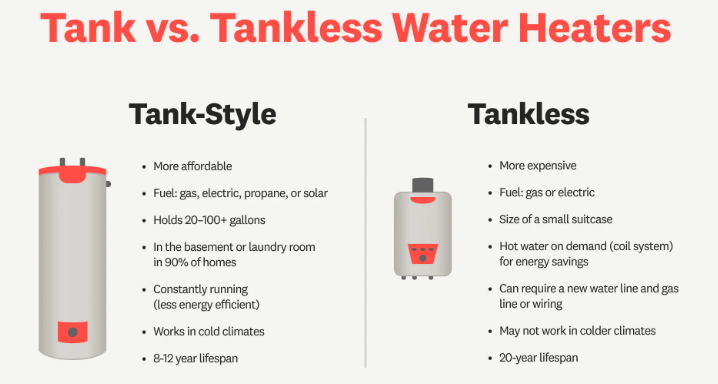Tank vs. Tankless Water Heaters: Which One Is Right for Your Home?
When it comes to choosing a water heater for your home, you’ll likely face the decision between a traditional tank water heater and a tankless (on-demand) water heater. Both have their advantages and drawbacks, depending on your household’s needs, budget, and energy efficiency goals. In this article, we’ll break down the pros and cons of each type, including differences in operating costs, gas requirements, and freeze protection.

Tank Water Heaters
How They Work
Traditional tank water heaters store a specific amount of water—typically 30 to 80 gallons—and keep it heated at a preset temperature. When you use hot water, the tank refills and reheats continuously.
Pros
✅ Lower Upfront Cost – Tank water heaters are generally more affordable to purchase and install.
✅ Easier Installation – Most homes are already set up for tank water heaters, making replacement simpler.
✅ Suitable for High Demand – If sized correctly, a tank system can supply enough hot water for multiple simultaneous uses.
Cons
❌ Higher Energy Costs – Since the water is heated continuously, you pay for standby energy loss even when hot water isn’t being used.
❌ Shorter Lifespan – Tank models typically last 8-12 years, whereas tankless models can last 20+ years.
❌ Bulkier Design – A large tank requires significant space, which can be an issue in smaller homes or apartments.
Gas Requirements
Gas-powered tank water heaters require standard ½-inch gas lines, making them compatible with most existing home setups.
Freeze Protection
Tank water heaters are usually installed indoors, making them less susceptible to freezing. However, if installed in an unheated garage or basement, insulating the tank and pipes is recommended to prevent freezing.
Tankless Water Heaters
How They Work
Tankless water heaters heat water on demand, meaning they only operate when hot water is needed. This eliminates standby energy loss and increases efficiency.
Pros
✅ Energy Efficiency – Since water is heated only when needed, tankless systems can reduce energy use by 24-34% compared to tank models.
✅ Endless Hot Water – With no storage limitations, you won’t run out of hot water—ideal for large families.
✅ Space-Saving Design – These compact units can be mounted on walls, freeing up valuable floor space.
✅ Longer Lifespan – Tankless water heaters often last 20+ years with proper maintenance.
Cons
❌ Higher Upfront Cost – The unit itself is more expensive, and installation may require modifications to gas lines or electrical systems.
❌ Limited Flow Rate – If multiple fixtures are running simultaneously, a single unit may struggle to supply enough hot water.
❌ May Require Gas Line Upgrades – Gas-powered tankless models often need ¾-inch gas lines, which may require professional upgrades.
Gas Requirements
Many tankless gas water heaters require higher gas flow rates than standard tank models. This means homes with older gas lines may need an upgrade to ensure proper operation.
Freeze Protection
Tankless models installed outdoors or in unheated areas include built-in freeze protection (usually down to -20°F). However, during extreme cold, it’s essential to insulate pipes and occasionally run warm water through the system to prevent freezing.
Operating Cost Differences
| Feature | Tank Water Heater | Tankless Water Heater |
|---|---|---|
| Energy Efficiency | Lower (due to standby heat loss) | Higher (only heats water when needed) |
| Monthly Operating Cost | Higher ($30-$50/month) | Lower ($20-$40/month) |
| Lifespan | 8-12 years | 20+ years |
| Average Installation Cost | $800-$2,000 | $2,000-$4,500 |
| Annual Gas Usage | ~200-300 therms | ~150-250 therms |
Gas vs. Electric: Which Type of Water Heater is Best for You?
Beyond deciding between tank and tankless water heaters, homeowners also need to choose between gas and electric models. Each type has its own benefits and drawbacks, depending on energy availability, cost, and efficiency. Below, we break down the differences between gas vs. electric tank and gas vs. electric tankless water heaters.
Gas vs. Electric Tank Water Heaters
| Feature | Gas Tank Water Heater | Electric Tank Water Heater |
|---|---|---|
| Upfront Cost | $800-$2,500 | $500-$1,500 |
| Operating Cost | Lower (natural gas is cheaper than electricity in most areas) | Higher (electricity costs more per BTU) |
| Recovery Time | Faster (heats water quickly) | Slower (heats water at a lower rate) |
| Energy Efficiency | ~60-70% efficiency | ~90% efficiency (less heat loss) |
| Lifespan | 8-12 years | 10-15 years |
| Installation Complexity | Requires gas line and venting | Simpler, requires only electrical connections |
Pros & Cons of Gas Tank Water Heaters
✅ Faster Recovery Time – Heats water much faster than electric models, making it ideal for large families.
✅ Lower Monthly Operating Costs – Gas is generally cheaper than electricity, reducing long-term expenses.
❌ Requires Venting – Must have proper ventilation, increasing installation complexity.
❌ More Maintenance – Gas models need occasional burner and vent cleaning.
Pros & Cons of Electric Tank Water Heaters
✅ Easier Installation – No need for gas lines or ventilation, making it ideal for homes without natural gas service.
✅ More Energy Efficient – Nearly all energy used goes into heating the water, with minimal heat loss.
❌ Slower Heating – Can take longer to heat a full tank, especially if demand is high.
❌ Higher Monthly Operating Costs – Electricity rates tend to be higher than natural gas in most areas.
Which One Should You Choose?
- If you prioritize upfront savings and easy installation, a tank water heater may be the better choice.
- If you want long-term energy savings, a longer lifespan, and unlimited hot water, a tankless system is worth considering.
At C.W. Inspections, we evaluate the condition of your water heater during our comprehensive home inspections, helping you make informed decisions about efficiency, performance, and potential upgrades.
Thinking about upgrading your water heater? Contact us today for a home inspection!
Clayton Weeks
225-803-8821
